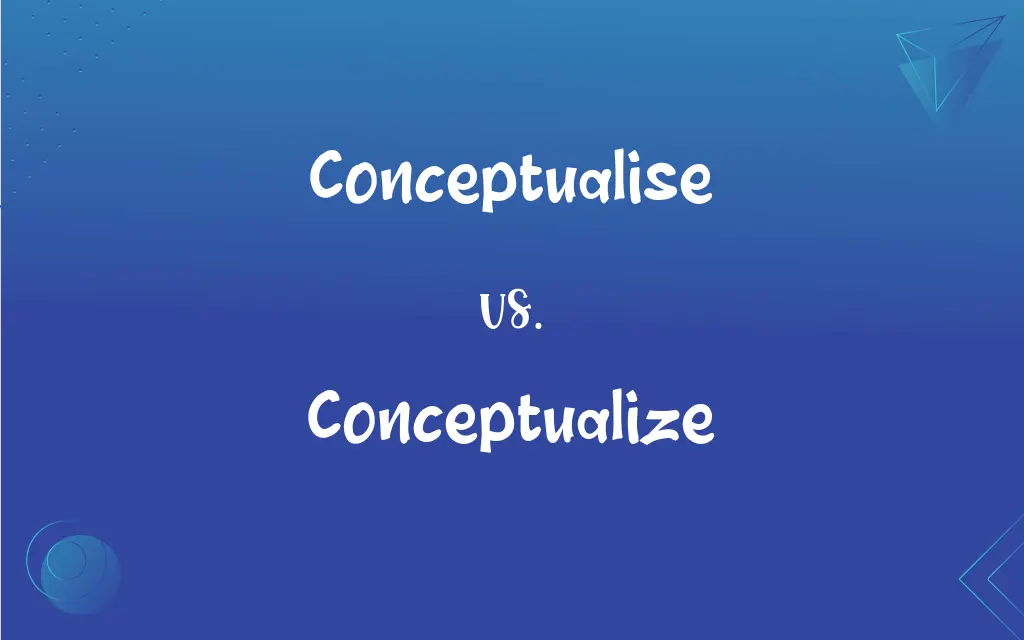Conceptualise vs. Conceptualize: What's the Difference?
Edited by Aimie Carlson || By Harlon Moss || Updated on November 12, 2023
Conceptualise and conceptualize are variants in British and American English spelling, respectively, both meaning to form a concept or idea.

Key Differences
Conceptualise and conceptualize represent the same concept in different English dialects. Conceptualise is commonly used in British English, while conceptualize is the preferred spelling in American English. Both words refer to the process of forming a concept or idea in the mind.
The difference between conceptualise and conceptualize lies primarily in regional spelling conventions. Conceptualise adheres to British English spelling rules that often include 's' where American English uses 'z'. Conversely, conceptualize follows the American English pattern of using 'z', reflecting the American English pronunciation tendencies.
In terms of usage, conceptualise and conceptualize do not differ. Whether one uses conceptualise or conceptualize depends on the audience and the standard language norms of the region. Both forms are understood globally and are interchangeable in the context of global English.
Educational and publishing standards may dictate the choice between conceptualise and conceptualize. British academic institutions and publications typically use conceptualise, while American counterparts opt for conceptualize. The meaning and application of the term remain constant across these variations.
In digital language tools like spell checkers and grammar software, conceptualise may be flagged as incorrect in American English settings, while conceptualize might be marked in British English settings. This distinction is purely technical, reflecting regional language preferences.
ADVERTISEMENT
Comparison Chart
Spelling Variation
Uses 's'
Uses 'z'
Regional Preference
Preferred in British English
Preferred in American English
Usage Context
Common in UK, Commonwealth
Common in the USA
Pronunciation
Similar, with subtle regional accents
Similar, with subtle regional accents
Digital Language Tools
May be marked in US English settings
May be marked in UK English settings
ADVERTISEMENT
Conceptualise and Conceptualize Definitions
Conceptualise
To form an idea.
She conceptualised a new approach to environmental conservation.
Conceptualize
To develop an abstract idea.
She conceptualized the principles of her philosophical theory.
Conceptualise
To mentally construct an idea.
The writer conceptualised the plot of her novel during a walk.
Conceptualize
To imagine or envision something.
The team conceptualized a marketing strategy that was unique and bold.
Conceptualise
To envision a concept.
The architect conceptualised a modern building that was both functional and aesthetic.
Conceptualize
To form a concept in the mind.
He conceptualized a new method for data analysis.
Conceptualise
To ideate creatively.
Artists often conceptualise their work through sketches and notes.
Conceptualize
To create a mental representation.
The inventor conceptualized a prototype before building it.
Conceptualise
To abstractly think about something.
He conceptualised the project's potential outcomes before starting.
Conceptualize
To theorize or hypothesize.
Scientists often conceptualize theories before conducting experiments.
Conceptualise
Standard spelling of conceptualize
Conceptualize
To form a concept or concepts of, and especially to interpret in a conceptual way
This cabaret performance was conceptualized as a homage to vaudeville.
Conceptualise
Same as conceptualize.
Conceptualize
To form concepts.
Conceptualise
Have the idea for;
He conceived of a robot that would help paralyzed patients
This library was well conceived
Conceptualize
To interpret a phenomenon by forming a concept.
Conceptualize
To conceive the idea for something.
Conceptualize
To to form a concept of; as, He could not conceptualize a robot that would help paralyzed patients.
Conceptualize
Have the idea for;
He conceived of a robot that would help paralyzed patients
This library was well conceived
FAQs
Can I use conceptualise in American English?
You can, but it's more common to use conceptualize in American English.
Are conceptualise and conceptualize interchangeable?
Yes, they are interchangeable and differ only in regional spelling.
Is conceptualise British or American English?
Conceptualise is British English.
Do dictionaries list both variants?
Yes, most modern dictionaries list both.
Can I use both forms in academic writing?
Yes, but it's best to be consistent and adhere to the spelling norms of your region or publication.
Are there other words like conceptualise and conceptualize?
Yes, many words have British and American English variants (e.g., organise/organize, realise/realize).
Does conceptualize have a different meaning in American English?
No, it has the same meaning as conceptualise.
Is there a pronunciation difference between the two?
The pronunciation is largely the same, though regional accents may influence subtle differences.
Will using conceptualise in the U.S. be considered incorrect?
Not necessarily incorrect, but it may be noted as a British variant.
Why do conceptualise and conceptualize have different spellings?
The difference is due to historical spelling conventions in British and American English.
How do I know which variant to use?
Consider your audience and the regional language norms.
Are both forms accepted in international English exams?
Generally, yes, both forms are accepted.
Can using the wrong variant impact my writing’s reception?
It might be noted by readers familiar with the other variant, but it generally doesn’t impact the overall reception.
How do English-speaking countries outside the UK and US treat these variants?
They often follow the convention of their nearest or most influential English-speaking country.
Is one form older than the other?
Both forms have evolved around the same time but in different regions.
Does the choice of variant affect the meaning in technical contexts?
No, the meaning remains the same in all contexts.
Do English language learners need to learn both forms?
It's helpful to be aware of both, but usually, one variant is sufficient.
Is one variant more correct than the other?
No, both are equally correct.
Do both variants appear in global publications?
Yes, both variants are used in global English publications.
Are there instances where one variant is preferred over the other?
Yes, depending on the regional and institutional standards.
About Author
Written by
Harlon MossHarlon is a seasoned quality moderator and accomplished content writer for Difference Wiki. An alumnus of the prestigious University of California, he earned his degree in Computer Science. Leveraging his academic background, Harlon brings a meticulous and informed perspective to his work, ensuring content accuracy and excellence.
Edited by
Aimie CarlsonAimie Carlson, holding a master's degree in English literature, is a fervent English language enthusiast. She lends her writing talents to Difference Wiki, a prominent website that specializes in comparisons, offering readers insightful analyses that both captivate and inform.































































